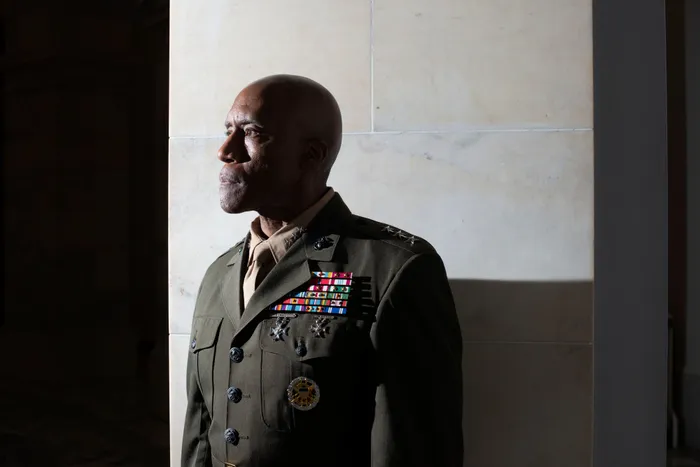First Black 4-star General Up for US Marines Africa Mission

Picture: Louie Palu/Agence VU for The Washington Post – Lieutenant-General Michael E Langley has served in Afghanistan, Somalia and Japan. If the Senate Armed Services Committee confirms his nomination, he will be the marines’ first black four-star general since the US Marine Corps founding 246 years ago.
By Rachel Chason and Dan Lamothe
In the late 1980s, Major Ronald Bailey met a young marine he knew had promise. Michael E Langley was a powerlifter who dominated flag football games, an intellectual who set records for how many training courses he wrote and a problem-solver whose bosses frequently asked him to mediate in workplace disputes.
Langley, then a first lieutenant, was also one of few young black marines based in the prestigious downtown DC barracks. Bailey, who went on to become a three-star general, took note.
He said he offered Langley advice based on his own experience and that of the black marines who had mentored him. “You will live under a microscope,” Bailey recalls telling Langley. ”You must always set the standard.”
More than three decades later, Langley is under the microscope yet again after being nominated to lead the United States (US) military forces as chief of its Africa Command. The Senate Armed Services Committee held a confirmation hearing on Thursday for Langley. If the senate confirms him, he will be the marines’ first black four-star general since the founding of the US Marine Corps 246 years ago.
Over that time, more than 70 white men have risen to the marines’ highest ranks. Aside from Bailey, a handful of black men have become three-star generals in the Marine Corps.
Other black officers have attained four stars in the army, air force and navy. But in the Marine Corps, black service members saw no one who looked like them in the top echelons of leadership and sometimes doubted whether it was possible.
Langley has served in Afghanistan, Somalia and Japan. He has held top jobs at the Pentagon and led US Marine Corps Forces Europe and Africa. He currently oversees marine forces on the East Coast.
Langley declined an interview for this story, with a spokesman saying the general is focused on the senate confirmation hearing. If confirmed, Langley will be based in Stuttgart, Germany, assuming control of roughly 6,000 US troops in Africa, including about 1,300 in west Africa and about 3,500 at a base in Djibouti, a spokesperson has said. He will replace Army General Stephen Townsend, who is retiring.
US forces are mostly engaged in training African militaries and helping build their capacities. Direct combat is rare, but deadly attacks in recent years on US soldiers in Niger and Kenya have led to increased scrutiny from US legislators of the mission.
Under President Joe Biden, hundreds of Special Operation troops are again to be deployed this year to Somalia. President Donald Trump withdrew all US troops from Somalia before leaving office. Michael O’Hanlon, a senior fellow at the Brookings Institution, said the US military in Africa faces “unique challenges”.
Instead of confronting a single threat, the US is focused on helping governments address a variety of challenges tied to climate change, population growth and political instability. Insurgencies in the Sahel region, along with the growing presence of Russian mercenaries, are of chief concern to the US.
Langley was briefly based in Stuttgart, leading the US Marine Corps Forces Europe and Africa beginning in November 2020 after his predecessor was removed amid allegations of using a racial slur for black Americans in front of troops.
Langley declined to comment on the allegations against his predecessor at the time, telling Stars and Stripes in an interview that the military, like society in general, was still “evolving” when it came to issues of race.
This is an edited version of the article first published in The Washington Post